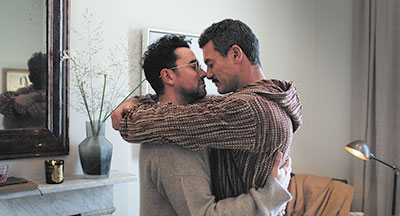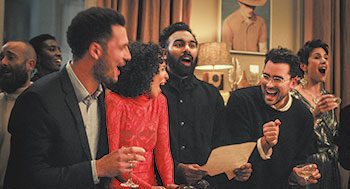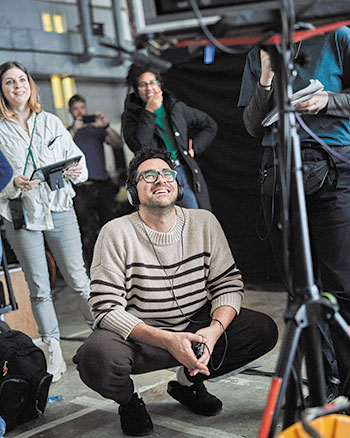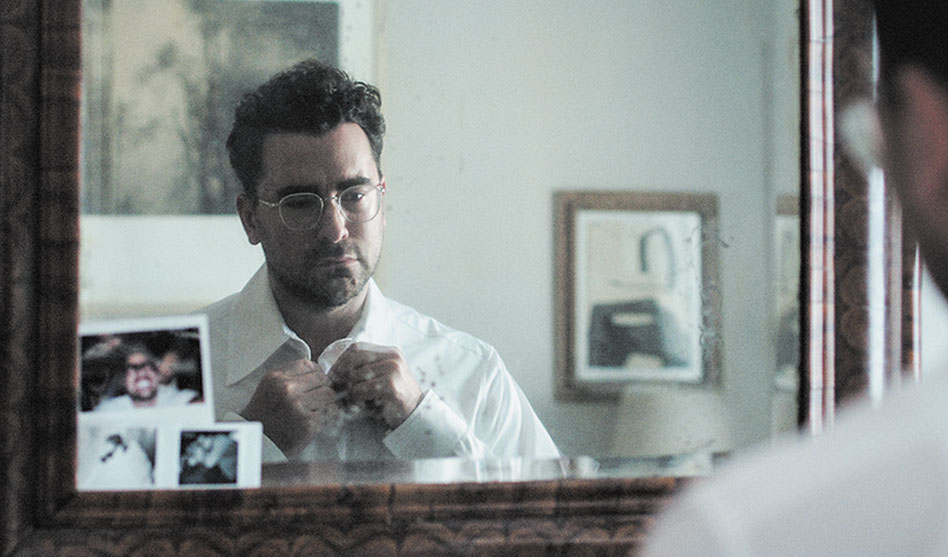Dan Levy starred in, top, and directed Good Grief.
‘Schitt’s Creek’ creator Dan Levy plays a grieving husband in his directorial film debut, ‘Good Grief’
CHRIS AZZOPARDI | Q Syndicate
The grief was very real for Dan Levy who lost his grandma and his rescue dog, Redmond, over the span of a couple of years during the pandemic. And then he did something very Dan Levy with that grief — he opened a blank page and got to work on Good Grief, a Netflix film out now, that he wrote, directed and stars in.
The film is the Schitt’s Creek creator’s first major endeavor since his Emmy-winning show became a sleeper hit. In it, Levy plays Marc, an artist we meet at a Christmas party that ends tragically for his husband, Oliver (Luke Evans), who dies in a car accident right outside their home.
 Marc is left trying to make sense of his sudden loss and what he didn’t know about Oliver’s life before it ended, which takes him to a secret flat Oliver had in Paris. With Marc on his unexpected journey to healing his shattered self are his friends, Sophie (Ruth Negga) and Thomas (Himesh Patel).
Marc is left trying to make sense of his sudden loss and what he didn’t know about Oliver’s life before it ended, which takes him to a secret flat Oliver had in Paris. With Marc on his unexpected journey to healing his shattered self are his friends, Sophie (Ruth Negga) and Thomas (Himesh Patel).
I recently spoke with Levy about the film, which he sees as an opportunity to flex new creative muscles, including his portrayal of a character who may be as stylish as David Rose even if he isn’t him, exactly.
CHRIS AZZOPARDI: It’s nice to have you back in regular conversation, Dan. It’s been a few years. The world was on a real Dan Levy kick for a while. DAN LEVY: I think it’s nice to take a break. You don’t want to ever overstay your welcome. So I’m happy that there’s something that I care about that I’m able to talk about now.
What goes through your mind when something that is so personal to you gets its wings and is released into the world? Well, it’s tough because it’s done. And I care deeply about it, and that’s all that really kind of matters to me outside of the viewers that watch it and, hopefully, find some point of connectivity in it.
It’s always a very sort of awkward thing to kind of have to sell your work. But I’m really happy with it, and it’s a movie that I know that I would like to watch and one that speaks to my life right now in a way that I feel is quite truthful.
At the end of the day, I’m grateful for the opportunity, ultimately. It’s a 180 from what people have come to know me from. And those opportunities don’t get handed out all the time. So I was really grateful that some people over at Netflix were willing to go in this new direction with me.
 I’m just glad that there’s a movie out there that speaks to my life in a meaningful way, that speaks to friendship and found family and the fact that, for a lot of people out there who are without kids and without partners, that friendships are the great loves of our lives.
I’m just glad that there’s a movie out there that speaks to my life in a meaningful way, that speaks to friendship and found family and the fact that, for a lot of people out there who are without kids and without partners, that friendships are the great loves of our lives.
Did you draw from your own found family for the film? I did. You know, I was realizing once you get into your 30s — I’m 40 now, but was 37 when I started developing the film — relationships change. Really good, long friendships. The more your life takes on weight, the more that applies to friendships and what we’re willing to compromise and what we’re willing not to, and the hard conversations we need to have in order to invest in our friendships so that they can have life going into the next 40 years of our lives.
It’s uncomfortable at times, but I’ve been finding myself having really meaningful, truthful conversations with friends through this desire to be OK. If you have a friendship that’s a decade or two decades old, there’s going to be some stuff that you need to talk about at some point, like an actual partner. And it’s about normalizing that, and the fact that those hard conversations are essentially an act of love. It’s an investment in a meaningful relationship.
How did working on this film help you process your own feelings around grief? Writing it really was the first step. I was going through some grief … and it was the only thing I could do, really. I wasn’t able to articulate it vocally. And I sat down at my computer and just started to write an outline for this film, and it came quite naturally. And it has nothing to do with my own personal grief, but everything to do with the feelings and the detangling of those feelings and trying to understand what it all means.
 It’s all been this wonderful catharsis of sorts, and this movie was huge for me in that sense. It led me to this path of understanding that culminates in a scene toward the end of the movie between my character and [actor] Celia Imrie, where she ultimately says, “To avoid sadness is also to avoid love.”
It’s all been this wonderful catharsis of sorts, and this movie was huge for me in that sense. It led me to this path of understanding that culminates in a scene toward the end of the movie between my character and [actor] Celia Imrie, where she ultimately says, “To avoid sadness is also to avoid love.”
That was one of the big takeaways from this whole experience for me, and it just ended up on the page.
In your own experience and through your exploration of grief, how do you think queer people are impacted differently when it comes to loss? I guess I can only really speak to my own experience because I think the community has experienced grief in so many different ways. And people are going to process it in so many different ways. I think for me, that really manifested in the friendships. In this idea of having a safety net of friends there to help you. Because I think for a lot of people in the community, they don’t have family to turn to. I’m very lucky that I do.
Did you think intentionally about how to move yourself away as an actor from David and Schitt’s Creek, considering how iconic that character has become? It’s a wonderful thing because there’s a real personal connection, I guess, to the character and people feeling like they know me. I’m, in some ways, very close to David, and in some ways completely opposite.
I think 80 episodes of doing the same character was the greatest experience, and yet you come out of it and you have a desire, as I think all actors do, to flex a different kind of muscle. And for me, I wanted to get into something a bit more dramatic. Unfortunately, given the culture of our industry, I only was receiving lesser versions of David Rose to play in other shows and movies.
And so I set out to write something for myself that I thought was a challenge. … As an actor, it really forced me to shake some habits that had formed over 80 episodes of playing an incredibly elastic, reactive human being. The character of Marc in this movie is so still and so calm, and shaking some of those impulses to broaden the performance was a real challenge.
Chris Azzopardi is editorial director of Pride Source Media Group and Q Syndicate, the national LGBTQ wire service. Reach him via Twitter @chrisazzopardi.
















